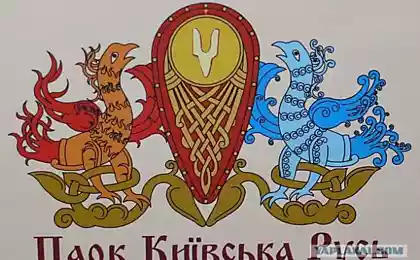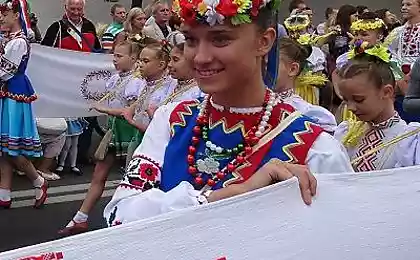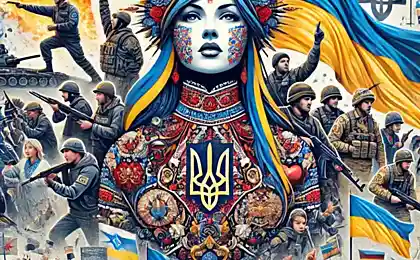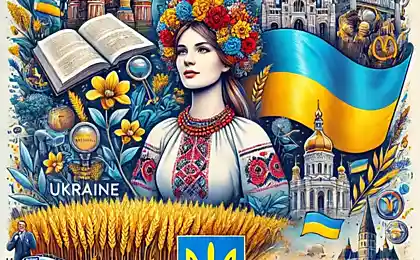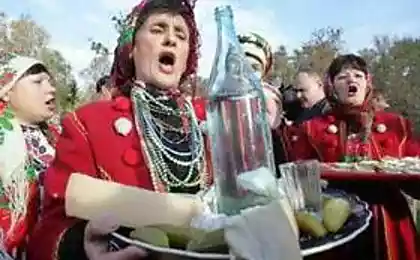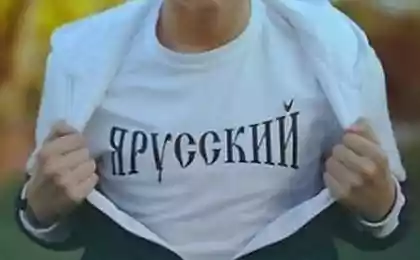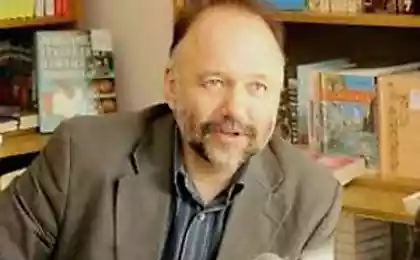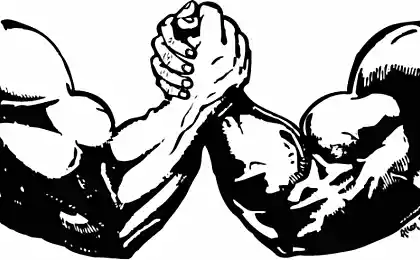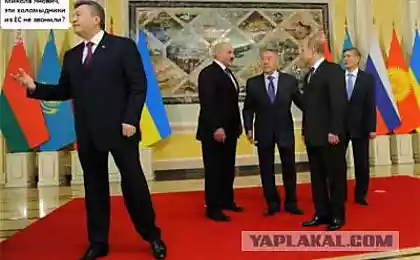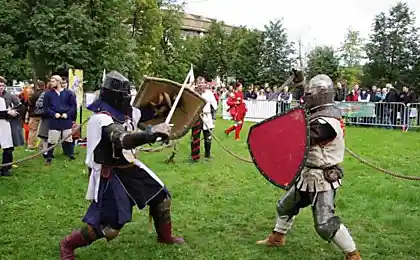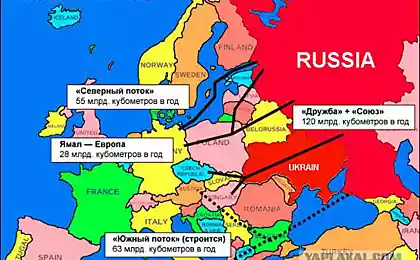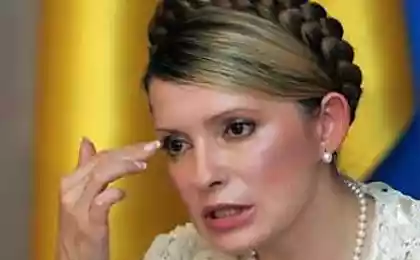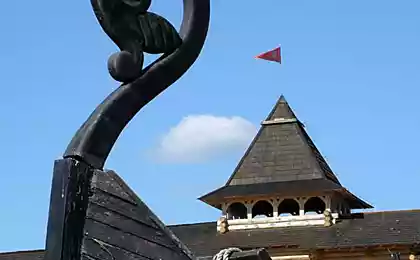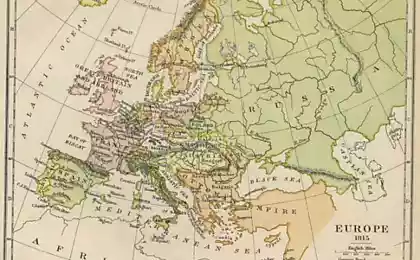2155
Muscovy stole the history of Kievan Rus-Ukraine.
In creating his Ukrainian state, Ukrainians should review and refine their story based on truth, reliable facts and historical events. While for centuries under the rule of the conquerors, the Ukrainians were actually deprived of the ability to influence the formation of national consciousness and the development of history, resulting in the history of Ukraine is written primarily for the sake of these invaders. Especially not clarified is the question of claims and claims of Muscovy, and later Russia, the historical legacy of Kievan Rus.
In the novel, the study Belinsky (Country Moksel or Muscovy / / Kiev: Publishing them. Elena Teligi, 2008, 2009, in three books) reported facts taken from historical sources (mainly Russian), which indicates a radical distortion of the history of the Russian Empire aimed at the creation of historical mythology that Muscovy and Kievan Rus have common historical roots, Muscovy had "inherited rights" to Russia.
Average fraud Muscovites, arrogated to themselves past the Grand Principality of Kiev and its people, dealt a terrible blow to the Ukrainian ethnos. The challenge now is to build on the true facts reveal the falsity and immorality Moscow mythology.
Autonomous Republic of Crimea
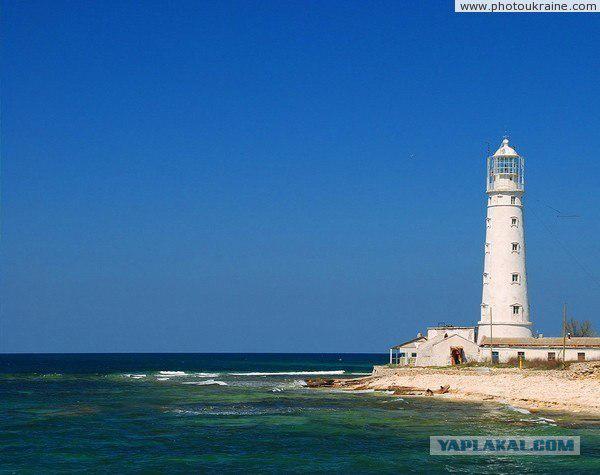
Consider the basic questions of this problem.
Moscow, Russian tsars and later realized that without a great past is impossible to create a great nation, a great empire. To do this it was necessary to decorate their historical past and even assign someone else. Therefore, Moscow kings, beginning with Ivan IV (the Terrible) (1533-1584), was tasked to appropriate the history of Kievan Rus, its glorious past and create an official mythology of the Russian Empire.
It could not ignore if this mythology did not affect the fundamental interests of Ukraine, was not aimed at the complete destruction of Ukraine - its history, language and culture. Time has shown that the Russian impershovinisty did and are doing everything possible to achieve this objective.
Over the centuries, especially since the beginning of the XVI century. instilled in people's heads and told that the Russian state and the Russian people originate from the Grand Duchy of Kiev; that Kievan Rus - the cradle of three fraternal peoples - Russian, Ukrainian and Belarusian; Russians under the law "starshebratstva" have the right to the legacy of Kievan Rus. This miserable lie still enjoys Russian historiography and public figures of Russia, as well as the "fifth column" in Ukraine, which includes communists or former Regions Regions in the Verkhovna Rada.
To date, Ukraine is divided into 24 regions, 2 cities of central subordination (Kiev and Sevastopol) and territorial autonomy - Autonomous Republic of Crimea. In addition, there are 490 districts, 118 urban districts, 29906 settlements (458 towns, 884 town and 28,564 villages), 10,281 village councils (on May 1, 2006)
02 - Athens
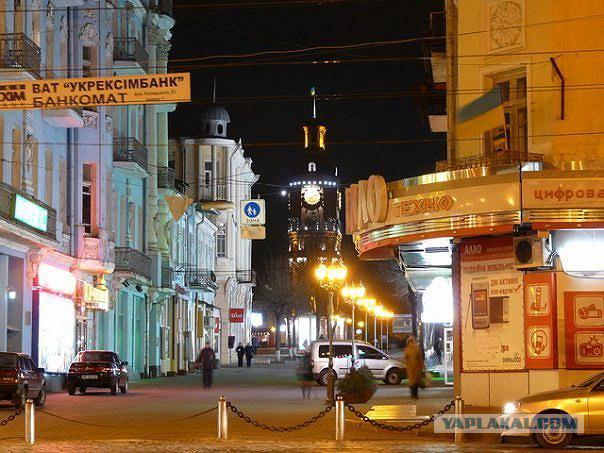
It is known that:
- During the existence of the state of Kievan Rus of Muscovy was not a single mention. It is known that Muscovy as ulus of the Golden Horde, founded by Khan Meng-Timur only in 1277. By this time the Kievan Rus had already existed for over 300 years;
- There is no evidence on the relationship of Kievan Rus Finnish ethnic group land "Moksel" and later with the Moscow principality of Kievan Rus principalities land to the XVI century. At that time, both in the 988 held the baptism of Kievan Rus state, the Finnish tribes of the earth "Moksel" were in a semi-wild state.
Volyn
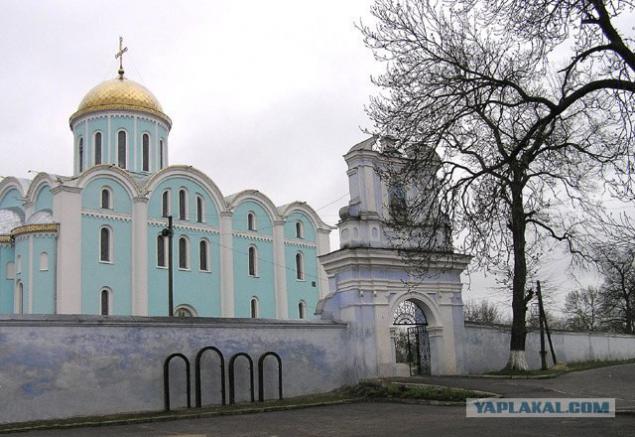
How can we talk about a "big brother", when the "big brother" was born a few centuries later rusichej Ukrainians. He has no moral right to call himself a "big brother" to dictate the rules of humanity existence, to impose their culture, language, worldview.
It is known that by the end of the XV century. there was no Russian state, there was an older brother of "Great" and the Russian people, and was Suzdal land - land Moksel and later Muscovy, was a member of the Golden Horde - Power Chingizids. With the end of the XIII to the beginning of the XVIII century. the people of this land called Muscovites. Moscow historians are silent on the question of his national origin.
Dnepropetrovsk
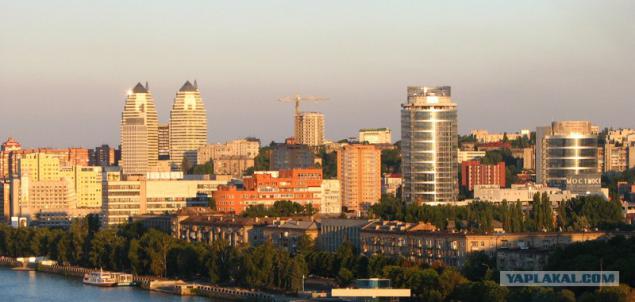
Muscovites, the Great Russians - who are they?
Muscovites. In the IX-XII centuries. a large region of Tula, Ryazan, and present the Moscow region, Meria, the whole, moksha, Chud, Mordvinians, Mari and others - all these people "moksel." These tribes later became the basis of the people, called himself "the Great."
In 1137 these lands came the youngest son of the prince of Kiev Monomakh - Yuri Dolgoruky, who was left without a princely table in Kiev principality. Yuri Dolgoruky began to reign in the lands of Rurik "Moksel" heading Suzdal. He has a woman of a local tribe son Andrew, who was named "Bogolyubsky." Born and raised in the backwoods in semi-wild environment Finnish tribes, Prince Andrew broke all ties with the parent team and the old customs of Kiev.
Donetsk
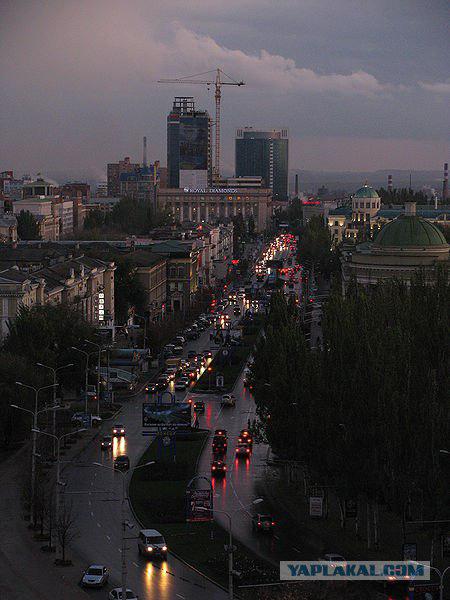
In 1169 Andrew Bogolyubskii conquered and destroyed Kiev came as a barbarian, who felt no kinship with Slavic shrine - Kiev.
In a short time (50-80 years) in every Finnish settlement was planted Prince of Rurik, a native of mother-meryanki, muromchanki, mokshanki ... So there were on the ground "Moksel" principality of Vladimir, Ryazan, Tver and others.
At this time on earth "Moksel" begin to penetrate individual missionaries to spread Christianity. On Mass "spillover" Slavs Dnieper area on the ground "Moksel", as claimed by Moscow historians can not go any speech. What Slavs with fertile land Pridneprovya go through impenetrable thickets and swamps thousands of kilometers into the unknown half-savage wilderness?
On the basis of Christianity on earth "Moksel" it begins to form, which eventually became Russian.
By the XII century. on lands "Moksel" lived only Finnish tribes. This is confirmed by archaeological excavations Uvarov ("They gave their life on the barrow excavation", 1872 - 215 pp.). In 7729 excavated mounds not found any Slavic burial.
Anthropological studies of AP Bogdanov and FK Vovk, who conducted the study of human skulls confirm the excellent features of the Finnish and Slavic ethnic groups.
In 1237, at the Suzdal came Tatar-Mongols. Everyone who bowed his head and kissed his boots Khan and took his citizenship, remained alive and well, who did not want to surrender - were destroyed. Vladimir Prince George and Jaroslav Vsevolodovich obedient Batu Khan. Thus, the land "Moksel" became part of the Golden Horde empire Genghis and its military force joined the military forces of the empire.
Zaporozhye

Headed by a military squad earth "Moksel" in the army of Batu Khan Vladimir Prince Yuri Gromov. The fact of the formation in 1238 of a military team of Finnish tribes, which were used in Batu conquests Europe in 1240-1242 years, is direct evidence establishing the rule of Khan in the Rostov-Suzdal.
For the period of the military campaign to Vsevolodovich Vladimir principality was planted younger brother George - Jaroslav Vsevolod, Batu Khan who gave her eight year old son Alexander Yaroslavich in Amanat (ie hostage). Having stayed in the Horde in Batu from 1238 to 1252, Alexander named and famed Russian historians as Nevsky, learned the whole structure and customs of the Golden Horde became Andom (blood brother) son Batu Sartak, married the daughter of Batu Khan, and later became a faithful servant of the Golden Horde as head Volodymyr's principality (1252-1263). He was not involved in any serious battle, all the victories of Alexander Nevsky - a pathetic lie. Prince Alexander could not take part in clashes on the Neva in 1240 and on Lake Peipus in 1242 while still a child.
Ivano-Frankivsk
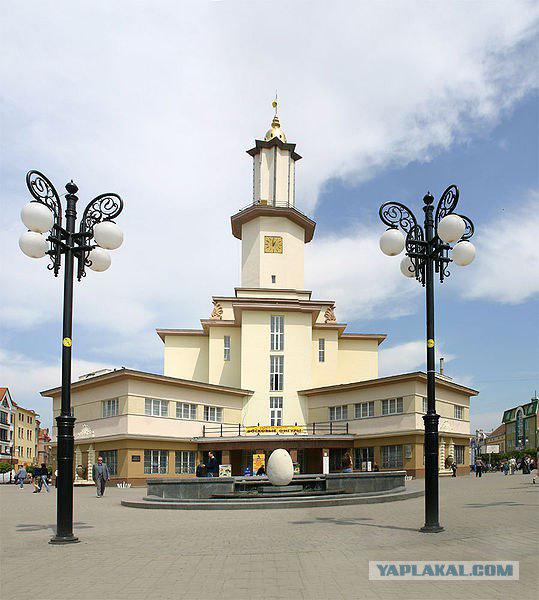
It should be noted that the management authority of the Rostov-Suzdal princes was minimal. Batu Khan to guide the principality (ulus) was appointed governor - big baskak and field - specific baskaks. It was the sovereign ruler of the Golden Horde, which were guided by the laws of Iasi Chingizids.
Russian historians is a lie and what Suzdal and later Moscow princes were independent of the Golden Horde. The first ruler of the principality (ulus) in Khan's literacy named baskak or Daruga and princes were considered at the second or even third place.
Is a lie and that Moscow was founded by Yury Dolgoruky in 1147. It is a myth that has no evidentiary confirmation. Moscow as a settlement was founded 1272. This year was held the third census of the Golden Horde. When the first census (1237-1238 pp.) And second (1254-1259 pp.) Settlement - Moscow is not mentioned.
Muscovy as a principality, which arose in 1277 on the orders of the Mongol Khan Meng-Timur and was common ulus of the Golden Horde. Moscow became the first Prince Daniel (1277-1303) (younger son of Alexander the so-called "Nevsky"). It originates from the Moscow princes Rurik dynasty. In 1319 Khan Uzbek (stated in the above-novel study Belinsky) appointed his brother Kulhana specific prince of Moscow, and from 1328 - Grand Prince of Moscow. In the Russian historical literature called as "Kalita", Khan Uzbek, converted to Islam, destroyed almost all the princes of the Rurik. In 1319-1328 pp. held a change of the Rurik dynasty to dynasty of Genghis Khan in Moscow ulus of the Golden Horde. And in 1598 in Muscovy interrupted dynasty sort of Genghis Khan, which began on Prince Ivan Kalita (Kulhana). That is about 270 years Moscow ruled pure Genghis Khan.
Kiev
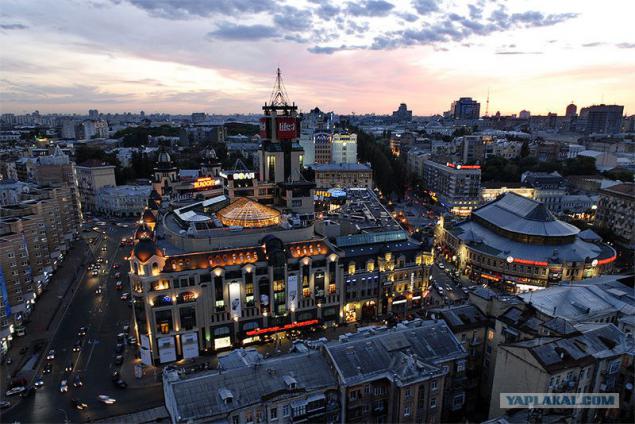
New Romanov dynasty (anvils) in 1613 pledged to keep holy the ancient traditions and taking an oath of allegiance to the old dynasty of Genghis Khan.
Moscow Orthodox Church in 1613 was the stabilizing force, which provides storage Tatar-Mongolian statehood in Muscovy.
The data show that the Muscovy is the direct heir of the Golden Horde Genghis state, that is, in fact, the Tatar-Mongols were the "godfathers" of the Moscow State. Muscovy (and since 1547 the kingdom) had no connection to the XVI century. with the principalities of Kievan Rus' lands.
Kirovograd
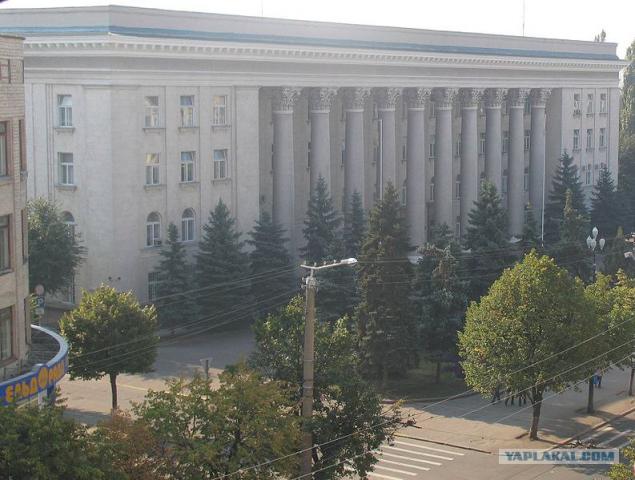
The Great. Great Russian tribe or nation, as it is now called, appeared about XV-XVII centuries. among Finnish tribes: Murom, least Vesey and others ... Then there is his story. No history of the Great Kiev on earth! Great story begins with "Zaleschanskoy land" with Muscovy, who were never Rus. Tatar-Mongols, who came to this land, have contributed significantly to the formation of "the Great." The psychology of Great-left their mark borrowing Mongol conqueror instinct, the despot, whose main goal - world domination.
So in the XVI century. formed a type of man-conqueror, terrible in his ignorance, rage and cruelty. These people did not need a European literature and culture, they are alien to such categories as morality, honesty, shame, honesty, dignity, historical memory etc ... Much of the Mongols in XIII-XVI centuries. merged into the Great, of them start their ancestry back more than 25% of Russia's "nobility". Here are some names of Tatars, who have brought glory to the Empire: Arakcheev, Bunin, Griboyedov, Derzhavin, Dostoevsky, Kuprin, Plekhanov, Saltykov-Shchedrin, Turgenev, Sheremet'ev Chaadayev and many others.
To give the history of Kievan Rus and perpetuate this theft, the Great had to suppress the Ukrainian people, to drive him into slavery, to deprive its own behalf, to starve to death, etc.
Ukrainians, who emerged as a nation in the XI-XII centuries., And possibly earlier declared a "Little Russians" and began to present this very version worldwide. For the slightest deviation from this version, people were executed, destroyed, exiled to the gulag. The Soviet period was particularly brutal. During the time Ukraine has lost more than 25 million of its sons and daughters who died in the wars for the interests of Russia, during the collectivization, the references and the dungeons.
So "big brother", "Great Russian" forced to live a "younger brother", "Little Russians" in the brutal "embrace of love."
Lugansk
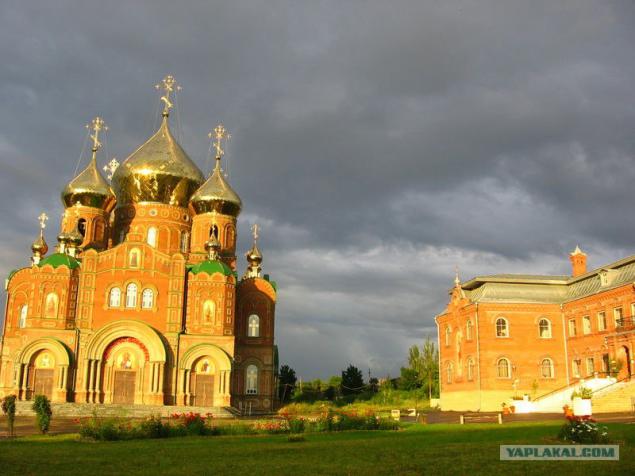
CREATING historical mythology of the Russian state
Even during the reign of Basil III (1505-1533) in Muscovy conceived the idea of greatness that made by the representative of the Moscow Orthodox monk Filofei: "Two Romes have fallen, and the third stands, and the fourth is not to be." Since then, Russian born the idea of omnipotence and the "chosen people" and that "Moscow - the third and last Rome." These thoughts were distributed and approved in Muscovy. How much blood has been shed Moscow princes, and later - for the sake of the kings of this idea-delusion.
In the reign of Ivan IV (the Terrible) claims Muscovy inheritance not only of Kievan Rus and the Byzantine Empire and amplified. So, according to legend, the Cap of Monomakh, allegedly donated by the Kievan prince Vladimir Monomakh by his grandfather - Basileus Constantine IX, considered a symbol of the transfer of power Byzantium Kievan Rus. Given that the first Prince of Suzdal was the sixth son of Vladimir Monomakh Yuri Dolgoruky, the presence of a Muscovy this cap is the "proof" of the inheritance rights of Muscovite rulers not only to the throne of Kiev, but also on the legacy of the former Byzantine Empire. Next was compiled false testament to transfer Vladimir Monomakh "inheritance rights" Monomakh's son Yuri Dolgoruky, the conqueror of so-called "Zaleschanskoy" land. It was all fiction. In fact, the Cap of Monomakh was Bukhara gold skullcap that Uzbek Khan gave Ivan Kalita (1319-1340), who adapted this skullcap for his exaltation. (Logvin Yu "Mare, Kalita and skullcap" Monomakh "/ / Time. - Kyiv, 1997, March 27).
Lions
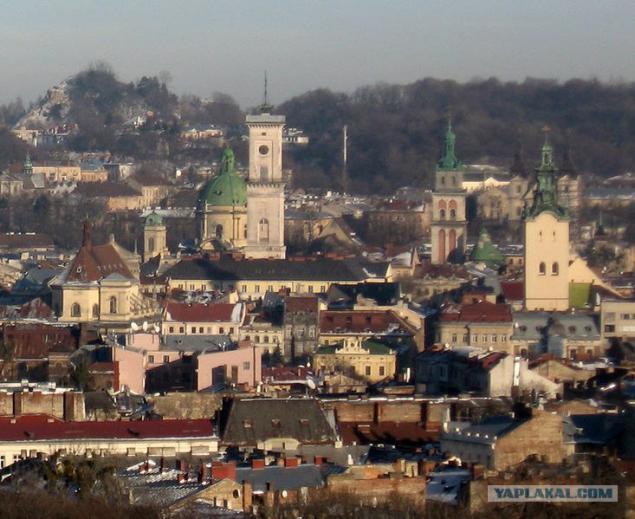
Ivan IV (the Terrible), for the first time in 1547 was married in the church with the title of king of Moscow, as a "wannabe" Greek and Roman emperors. Of the 37 signatures, which sealed the letter, sent from Constantinople to Moscow, 35 were counterfeit. So Ivan the Terrible was the "heir of the Byzantine emperors." So legalize lie.
Nikolaev
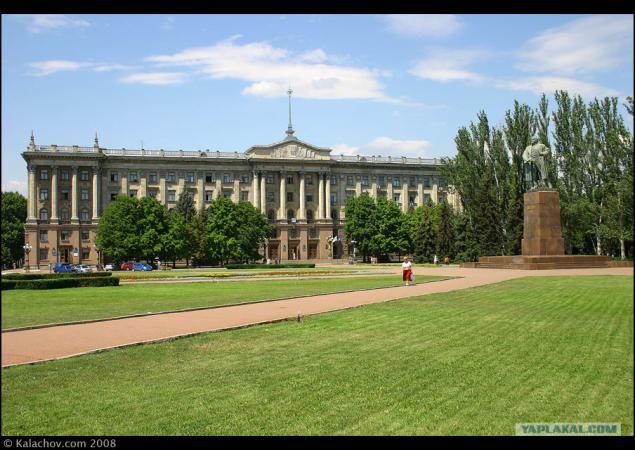
Massive state falsification of history of his people began to Peter I. He was the first in 1701 issued a decree on the withdrawal from the conquered peoples of all written national monuments: the chronicles, chronographs, chronicles, ancient historical records, church documents, archives, etc ... This was especially true Ukraine-Rus.
In 1716, Peter I «takes up" with the so-called Koenigsberg Chronicle, where it was shown "unification" of the ancient chronicles of Kiev and Moscow principalities and justify the unity of Slavic and Finnish land. However, access to the "copy" -falshivke as to the most original, closed.
Odessa
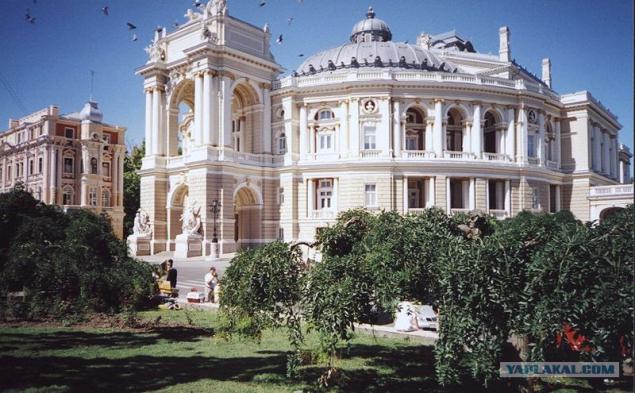
This falsification Petrov became the basis for further fraud - writing t. N. "All-Russian chronicles", which was justified by the right of Muscovy to the heredity of Kievan Rus. On the basis of these falsifications October 22, 1721 Muscovy declared itself the Russian Empire and the Muscovites - Russian. So was stolen from the legal heirs of Kievan Rus - Ukrainian historical name Rus.
Peter introduced from Europe a large number of experts, including professional historians who are attracted to the writing and the falsification of the history of the Russian state.
To do this, every foreigner joined the civil service, gave the oath of non-disclosure of state secrets and pledged never to leave Muscovy. The question arises, what could be state secrets at "processing of Russian history" of ancient times? In any civilized country in Europe after 30-50 years all declassified archives. The Russian empire is afraid of the truth about his past. Deathly afraid!
After Peter I, who turned Muscovy in the Russian state, the elite of Muscovy began to think about the need to create a coherent story of their own state. For this thing carefully took the Empress Catherine II (1762-1796), did not admit the idea that in the royal family, it may be common among the Tatar-Mongol nobility. Catherine II, European-educated man, acquainted with archival primary sources note that the entire history of the state rests on the verbal epic mythology and has no evidence.
Poltava
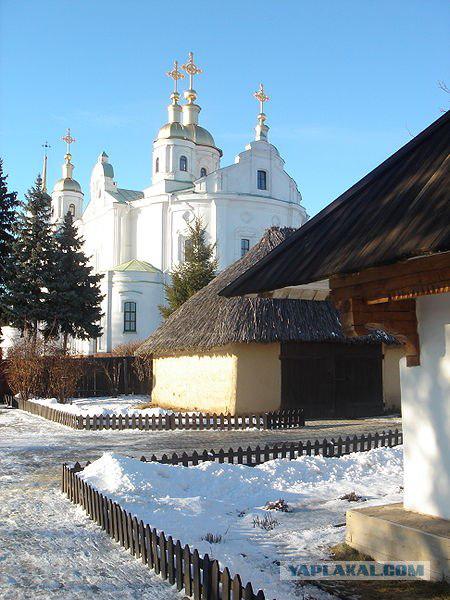
Therefore, Catherine II issued a decree on December 4, 1783 creates a "commission to make notes about the ancient history of mostly Russian" under the direction and supervision of Count AP Shuvalov, composed of 10 eminent historians. The main task that was put before the Commission, was that due to overtime chronicles, writing new chronicles and other fraud to justify the "legitimacy" of appropriation Muscovy historical legacy of Kievan Rus' and the creation of historical mythology of the Russian state. The Commission has worked for 10 years. In 1792, "Catherine's Story" was released. The commission's work was carried out in the following areas:
- Collect all written documents (chronicles, archives, etc.). This work has been partially made by Peter I. Collection of materials was carried out not only from their own country and from other countries - Poland, Turkey, etc. ..;
Exactly
Sevastopol
Sumi
Ternopil
Uzhgorod
Kharkiv
Kherson
Khmelnitsky
Cherkassy
Chernihiv
Chernovtsy
Exactly
In the novel, the study Belinsky (Country Moksel or Muscovy / / Kiev: Publishing them. Elena Teligi, 2008, 2009, in three books) reported facts taken from historical sources (mainly Russian), which indicates a radical distortion of the history of the Russian Empire aimed at the creation of historical mythology that Muscovy and Kievan Rus have common historical roots, Muscovy had "inherited rights" to Russia.
Average fraud Muscovites, arrogated to themselves past the Grand Principality of Kiev and its people, dealt a terrible blow to the Ukrainian ethnos. The challenge now is to build on the true facts reveal the falsity and immorality Moscow mythology.
Autonomous Republic of Crimea

Consider the basic questions of this problem.
Moscow, Russian tsars and later realized that without a great past is impossible to create a great nation, a great empire. To do this it was necessary to decorate their historical past and even assign someone else. Therefore, Moscow kings, beginning with Ivan IV (the Terrible) (1533-1584), was tasked to appropriate the history of Kievan Rus, its glorious past and create an official mythology of the Russian Empire.
It could not ignore if this mythology did not affect the fundamental interests of Ukraine, was not aimed at the complete destruction of Ukraine - its history, language and culture. Time has shown that the Russian impershovinisty did and are doing everything possible to achieve this objective.
Over the centuries, especially since the beginning of the XVI century. instilled in people's heads and told that the Russian state and the Russian people originate from the Grand Duchy of Kiev; that Kievan Rus - the cradle of three fraternal peoples - Russian, Ukrainian and Belarusian; Russians under the law "starshebratstva" have the right to the legacy of Kievan Rus. This miserable lie still enjoys Russian historiography and public figures of Russia, as well as the "fifth column" in Ukraine, which includes communists or former Regions Regions in the Verkhovna Rada.
To date, Ukraine is divided into 24 regions, 2 cities of central subordination (Kiev and Sevastopol) and territorial autonomy - Autonomous Republic of Crimea. In addition, there are 490 districts, 118 urban districts, 29906 settlements (458 towns, 884 town and 28,564 villages), 10,281 village councils (on May 1, 2006)
02 - Athens

It is known that:
- During the existence of the state of Kievan Rus of Muscovy was not a single mention. It is known that Muscovy as ulus of the Golden Horde, founded by Khan Meng-Timur only in 1277. By this time the Kievan Rus had already existed for over 300 years;
- There is no evidence on the relationship of Kievan Rus Finnish ethnic group land "Moksel" and later with the Moscow principality of Kievan Rus principalities land to the XVI century. At that time, both in the 988 held the baptism of Kievan Rus state, the Finnish tribes of the earth "Moksel" were in a semi-wild state.
Volyn

How can we talk about a "big brother", when the "big brother" was born a few centuries later rusichej Ukrainians. He has no moral right to call himself a "big brother" to dictate the rules of humanity existence, to impose their culture, language, worldview.
It is known that by the end of the XV century. there was no Russian state, there was an older brother of "Great" and the Russian people, and was Suzdal land - land Moksel and later Muscovy, was a member of the Golden Horde - Power Chingizids. With the end of the XIII to the beginning of the XVIII century. the people of this land called Muscovites. Moscow historians are silent on the question of his national origin.
Dnepropetrovsk

Muscovites, the Great Russians - who are they?
Muscovites. In the IX-XII centuries. a large region of Tula, Ryazan, and present the Moscow region, Meria, the whole, moksha, Chud, Mordvinians, Mari and others - all these people "moksel." These tribes later became the basis of the people, called himself "the Great."
In 1137 these lands came the youngest son of the prince of Kiev Monomakh - Yuri Dolgoruky, who was left without a princely table in Kiev principality. Yuri Dolgoruky began to reign in the lands of Rurik "Moksel" heading Suzdal. He has a woman of a local tribe son Andrew, who was named "Bogolyubsky." Born and raised in the backwoods in semi-wild environment Finnish tribes, Prince Andrew broke all ties with the parent team and the old customs of Kiev.
Donetsk

In 1169 Andrew Bogolyubskii conquered and destroyed Kiev came as a barbarian, who felt no kinship with Slavic shrine - Kiev.
In a short time (50-80 years) in every Finnish settlement was planted Prince of Rurik, a native of mother-meryanki, muromchanki, mokshanki ... So there were on the ground "Moksel" principality of Vladimir, Ryazan, Tver and others.
At this time on earth "Moksel" begin to penetrate individual missionaries to spread Christianity. On Mass "spillover" Slavs Dnieper area on the ground "Moksel", as claimed by Moscow historians can not go any speech. What Slavs with fertile land Pridneprovya go through impenetrable thickets and swamps thousands of kilometers into the unknown half-savage wilderness?
On the basis of Christianity on earth "Moksel" it begins to form, which eventually became Russian.
By the XII century. on lands "Moksel" lived only Finnish tribes. This is confirmed by archaeological excavations Uvarov ("They gave their life on the barrow excavation", 1872 - 215 pp.). In 7729 excavated mounds not found any Slavic burial.
Anthropological studies of AP Bogdanov and FK Vovk, who conducted the study of human skulls confirm the excellent features of the Finnish and Slavic ethnic groups.
In 1237, at the Suzdal came Tatar-Mongols. Everyone who bowed his head and kissed his boots Khan and took his citizenship, remained alive and well, who did not want to surrender - were destroyed. Vladimir Prince George and Jaroslav Vsevolodovich obedient Batu Khan. Thus, the land "Moksel" became part of the Golden Horde empire Genghis and its military force joined the military forces of the empire.
Zaporozhye

Headed by a military squad earth "Moksel" in the army of Batu Khan Vladimir Prince Yuri Gromov. The fact of the formation in 1238 of a military team of Finnish tribes, which were used in Batu conquests Europe in 1240-1242 years, is direct evidence establishing the rule of Khan in the Rostov-Suzdal.
For the period of the military campaign to Vsevolodovich Vladimir principality was planted younger brother George - Jaroslav Vsevolod, Batu Khan who gave her eight year old son Alexander Yaroslavich in Amanat (ie hostage). Having stayed in the Horde in Batu from 1238 to 1252, Alexander named and famed Russian historians as Nevsky, learned the whole structure and customs of the Golden Horde became Andom (blood brother) son Batu Sartak, married the daughter of Batu Khan, and later became a faithful servant of the Golden Horde as head Volodymyr's principality (1252-1263). He was not involved in any serious battle, all the victories of Alexander Nevsky - a pathetic lie. Prince Alexander could not take part in clashes on the Neva in 1240 and on Lake Peipus in 1242 while still a child.
Ivano-Frankivsk

It should be noted that the management authority of the Rostov-Suzdal princes was minimal. Batu Khan to guide the principality (ulus) was appointed governor - big baskak and field - specific baskaks. It was the sovereign ruler of the Golden Horde, which were guided by the laws of Iasi Chingizids.
Russian historians is a lie and what Suzdal and later Moscow princes were independent of the Golden Horde. The first ruler of the principality (ulus) in Khan's literacy named baskak or Daruga and princes were considered at the second or even third place.
Is a lie and that Moscow was founded by Yury Dolgoruky in 1147. It is a myth that has no evidentiary confirmation. Moscow as a settlement was founded 1272. This year was held the third census of the Golden Horde. When the first census (1237-1238 pp.) And second (1254-1259 pp.) Settlement - Moscow is not mentioned.
Muscovy as a principality, which arose in 1277 on the orders of the Mongol Khan Meng-Timur and was common ulus of the Golden Horde. Moscow became the first Prince Daniel (1277-1303) (younger son of Alexander the so-called "Nevsky"). It originates from the Moscow princes Rurik dynasty. In 1319 Khan Uzbek (stated in the above-novel study Belinsky) appointed his brother Kulhana specific prince of Moscow, and from 1328 - Grand Prince of Moscow. In the Russian historical literature called as "Kalita", Khan Uzbek, converted to Islam, destroyed almost all the princes of the Rurik. In 1319-1328 pp. held a change of the Rurik dynasty to dynasty of Genghis Khan in Moscow ulus of the Golden Horde. And in 1598 in Muscovy interrupted dynasty sort of Genghis Khan, which began on Prince Ivan Kalita (Kulhana). That is about 270 years Moscow ruled pure Genghis Khan.
Kiev

New Romanov dynasty (anvils) in 1613 pledged to keep holy the ancient traditions and taking an oath of allegiance to the old dynasty of Genghis Khan.
Moscow Orthodox Church in 1613 was the stabilizing force, which provides storage Tatar-Mongolian statehood in Muscovy.
The data show that the Muscovy is the direct heir of the Golden Horde Genghis state, that is, in fact, the Tatar-Mongols were the "godfathers" of the Moscow State. Muscovy (and since 1547 the kingdom) had no connection to the XVI century. with the principalities of Kievan Rus' lands.
Kirovograd

The Great. Great Russian tribe or nation, as it is now called, appeared about XV-XVII centuries. among Finnish tribes: Murom, least Vesey and others ... Then there is his story. No history of the Great Kiev on earth! Great story begins with "Zaleschanskoy land" with Muscovy, who were never Rus. Tatar-Mongols, who came to this land, have contributed significantly to the formation of "the Great." The psychology of Great-left their mark borrowing Mongol conqueror instinct, the despot, whose main goal - world domination.
So in the XVI century. formed a type of man-conqueror, terrible in his ignorance, rage and cruelty. These people did not need a European literature and culture, they are alien to such categories as morality, honesty, shame, honesty, dignity, historical memory etc ... Much of the Mongols in XIII-XVI centuries. merged into the Great, of them start their ancestry back more than 25% of Russia's "nobility". Here are some names of Tatars, who have brought glory to the Empire: Arakcheev, Bunin, Griboyedov, Derzhavin, Dostoevsky, Kuprin, Plekhanov, Saltykov-Shchedrin, Turgenev, Sheremet'ev Chaadayev and many others.
To give the history of Kievan Rus and perpetuate this theft, the Great had to suppress the Ukrainian people, to drive him into slavery, to deprive its own behalf, to starve to death, etc.
Ukrainians, who emerged as a nation in the XI-XII centuries., And possibly earlier declared a "Little Russians" and began to present this very version worldwide. For the slightest deviation from this version, people were executed, destroyed, exiled to the gulag. The Soviet period was particularly brutal. During the time Ukraine has lost more than 25 million of its sons and daughters who died in the wars for the interests of Russia, during the collectivization, the references and the dungeons.
So "big brother", "Great Russian" forced to live a "younger brother", "Little Russians" in the brutal "embrace of love."
Lugansk

CREATING historical mythology of the Russian state
Even during the reign of Basil III (1505-1533) in Muscovy conceived the idea of greatness that made by the representative of the Moscow Orthodox monk Filofei: "Two Romes have fallen, and the third stands, and the fourth is not to be." Since then, Russian born the idea of omnipotence and the "chosen people" and that "Moscow - the third and last Rome." These thoughts were distributed and approved in Muscovy. How much blood has been shed Moscow princes, and later - for the sake of the kings of this idea-delusion.
In the reign of Ivan IV (the Terrible) claims Muscovy inheritance not only of Kievan Rus and the Byzantine Empire and amplified. So, according to legend, the Cap of Monomakh, allegedly donated by the Kievan prince Vladimir Monomakh by his grandfather - Basileus Constantine IX, considered a symbol of the transfer of power Byzantium Kievan Rus. Given that the first Prince of Suzdal was the sixth son of Vladimir Monomakh Yuri Dolgoruky, the presence of a Muscovy this cap is the "proof" of the inheritance rights of Muscovite rulers not only to the throne of Kiev, but also on the legacy of the former Byzantine Empire. Next was compiled false testament to transfer Vladimir Monomakh "inheritance rights" Monomakh's son Yuri Dolgoruky, the conqueror of so-called "Zaleschanskoy" land. It was all fiction. In fact, the Cap of Monomakh was Bukhara gold skullcap that Uzbek Khan gave Ivan Kalita (1319-1340), who adapted this skullcap for his exaltation. (Logvin Yu "Mare, Kalita and skullcap" Monomakh "/ / Time. - Kyiv, 1997, March 27).
Lions

Ivan IV (the Terrible), for the first time in 1547 was married in the church with the title of king of Moscow, as a "wannabe" Greek and Roman emperors. Of the 37 signatures, which sealed the letter, sent from Constantinople to Moscow, 35 were counterfeit. So Ivan the Terrible was the "heir of the Byzantine emperors." So legalize lie.
Nikolaev

Massive state falsification of history of his people began to Peter I. He was the first in 1701 issued a decree on the withdrawal from the conquered peoples of all written national monuments: the chronicles, chronographs, chronicles, ancient historical records, church documents, archives, etc ... This was especially true Ukraine-Rus.
In 1716, Peter I «takes up" with the so-called Koenigsberg Chronicle, where it was shown "unification" of the ancient chronicles of Kiev and Moscow principalities and justify the unity of Slavic and Finnish land. However, access to the "copy" -falshivke as to the most original, closed.
Odessa

This falsification Petrov became the basis for further fraud - writing t. N. "All-Russian chronicles", which was justified by the right of Muscovy to the heredity of Kievan Rus. On the basis of these falsifications October 22, 1721 Muscovy declared itself the Russian Empire and the Muscovites - Russian. So was stolen from the legal heirs of Kievan Rus - Ukrainian historical name Rus.
Peter introduced from Europe a large number of experts, including professional historians who are attracted to the writing and the falsification of the history of the Russian state.
To do this, every foreigner joined the civil service, gave the oath of non-disclosure of state secrets and pledged never to leave Muscovy. The question arises, what could be state secrets at "processing of Russian history" of ancient times? In any civilized country in Europe after 30-50 years all declassified archives. The Russian empire is afraid of the truth about his past. Deathly afraid!
After Peter I, who turned Muscovy in the Russian state, the elite of Muscovy began to think about the need to create a coherent story of their own state. For this thing carefully took the Empress Catherine II (1762-1796), did not admit the idea that in the royal family, it may be common among the Tatar-Mongol nobility. Catherine II, European-educated man, acquainted with archival primary sources note that the entire history of the state rests on the verbal epic mythology and has no evidence.
Poltava

Therefore, Catherine II issued a decree on December 4, 1783 creates a "commission to make notes about the ancient history of mostly Russian" under the direction and supervision of Count AP Shuvalov, composed of 10 eminent historians. The main task that was put before the Commission, was that due to overtime chronicles, writing new chronicles and other fraud to justify the "legitimacy" of appropriation Muscovy historical legacy of Kievan Rus' and the creation of historical mythology of the Russian state. The Commission has worked for 10 years. In 1792, "Catherine's Story" was released. The commission's work was carried out in the following areas:
- Collect all written documents (chronicles, archives, etc.). This work has been partially made by Peter I. Collection of materials was carried out not only from their own country and from other countries - Poland, Turkey, etc. ..;
Exactly
Sevastopol
Sumi
Ternopil
Uzhgorod
Kharkiv
Kherson
Khmelnitsky
Cherkassy
Chernihiv
Chernovtsy
Exactly

